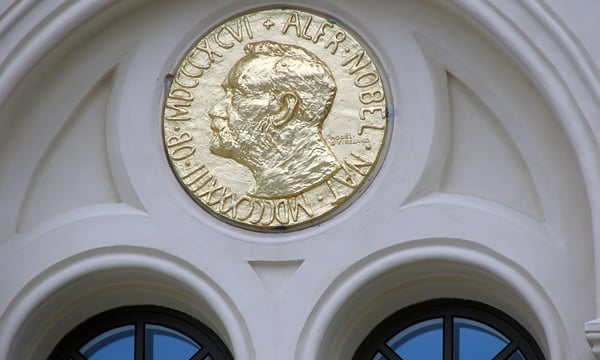China’s rise in science has been even more dramatic than its rapid economic development. China and the United States currently spend far more on research and development and publish significantly more scientific publications than any other country. Many Chinese scientists are highly cited, but Nobel laureates remain scarce and many in China were once again disappointed when the last prize was awarded on October 13.
Chinese nationals have won the Nobel peace prize (Liu Xiaobo, who has been strenuously disavowed by Beijing) and the Nobel prize for literature (Mo Yan), but malaria researcher Tu Youyou’s 2015 award in medicine is the lone recognition of a Chinese national in the sciences. In the past ten years (2016–2025), China has not received a single one of a total 106 prizes in science and economics while citizens of the United States have earned 63.
Nobel prizes are often awarded for work performed decades earlier, and more Chinese scientists could become laureates in the future. However, as China has earned so few prizes, and the level of Chinese research funding has already been high for some time, the time lag cannot explain most of the difference.
I argue that the current Chinese education and science cultures and policies are not building a curiosity-driven intrinsic motivation among Chinese scientists and are therefore not conducive to game-changing research. Most scientists in every country repeat established methods on well-studied themes. Only exceptionally curious minds instead seek answers to questions about the world around them, and when an answer is not available, they passionately develop a method to get the answer, which may lead to important new openings.
There are three options for increasing the number of these exceptionally curious minds in China. China could attract more foreign scientists, Chinese researchers based abroad could be lured back, or domestic education and research policies could be improved.
Much of the most applauded “American” research has been carried out by recent immigrants. Of the 63 recent laureates having U.S. citizenship, 16 had another passport as well. No wonder that in 2020 China’s President Xi Jinping insisted: “We must progressively open up to international S&T organizations setting up in our country’s territory and foreign-national scientists taking up positions in our country’s academic S&T organizations, making our country into a broad global stage for open S&T cooperation.”
In practice, the proportion of foreign scientists in China has been minuscule, and it seems hopeless that enough quantities could be attracted to the country to make it worth adding English as a second language of administration in universities of other research institutions. Potential newcomers are anxious about restrictions on freedom of speech.
Those who have worked in China for some time understand that these restrictions do not directly influence most researchers, yet researchers face practical challenges in their everyday lives. The increasing control exerted over Chinese citizens by the authorities slows down the internet and can make mundane tasks, such as buying a metro ticket in Beijing, difficult for foreigners without a Chinese ID number. Both potential newcomers and those who have already stayed in China may be repelled by the country’s strengthening alliance with Russia and increasingly aggressive foreign policy.
The second option is to lure back Chinese scientists from abroad. This has already been an important strategy for decades, and a large number have returned to benefit from lucrative contracts, high purchasing power, and the possibility to lead large research groups. These policies have been pivotal in China’s remarkable scientific rise. However, the emigrants willing to return to China, may face similar limits on their intrinsic motivation to explore unknown topics as those who have never left, or may refocus on social connections and hierarchies instead of research soon after returning
The most promising approach is to change China’s education system and research policies to encourage individualism, creativity, and courage to challenge established thinking and to allow those naturally showing these traits to continue educating themselves. The exam-oriented school education should be reformed to focus more on problem solving. Teachers should encourage pupils to ask why and to develop genuine curiosity.
In practice, a large share of China’s overall talent is excluded from the search for genius, as social mobility is low due to substandard rural primary education and inequality caused by expensive private evening tutoring. Universities and other research institutes should weaken hierarchies e.g., by reducing the role of previous supervisors in subsequent recruiting and by providing funding for independent early-career scientists to lead their own curiosity-driven high-risk research. To avoid the accumulation of funding in specific research groups, evaluations should be based on outputs per money spent and not outputs per person. Quantifying outputs is challenging, but focusing mainly on citations is dangerous as this can incentivize creation of silos, with intense citing among a small number of researchers, but with little value to other scientists or society at large. Instead, more weight should be put on the innovativeness of the research.
Implementing significant policy changes in areas deeply embedded in cultural traditions presents considerable challenges. However, if successfully implemented, the changes would ensure that a higher proportion of China’s naturally talented and curious citizens end up in good universities and pursue academic careers, that they are encouraged to enjoy science and innovative thinking challenging the norms, and attempt to understand the world and not just publish scientific articles. And maybe some of these researchers might earn a Nobel prize in the future.






